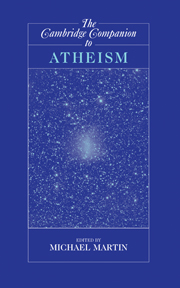Book contents
- Frontmatter
- General Introduction
- Part I Background
- Part II The Case against Theism
- Part III Implications
- 13 Atheism and Religion
- 14 Feminism and Atheism
- 15 Atheism and the Freedom of Religion
- 16 Atheism, A/theology, and the Postmodern Condition
- 17 Anthropological Theories of Religion
- 18 Atheists: A Psychological Profile
- Index
- Series List
18 - Atheists: A Psychological Profile
from Part III - Implications
Published online by Cambridge University Press: 28 January 2007
- Frontmatter
- General Introduction
- Part I Background
- Part II The Case against Theism
- Part III Implications
- 13 Atheism and Religion
- 14 Feminism and Atheism
- 15 Atheism and the Freedom of Religion
- 16 Atheism, A/theology, and the Postmodern Condition
- 17 Anthropological Theories of Religion
- 18 Atheists: A Psychological Profile
- Index
- Series List
Summary
Those who have shaped the modern human sciences have been preoccupied with explaining the phenomena of religion and religiosity. Accounting for the absence of religious faith has never been of much concern to them. The reasons for the neglect of atheism as a phenomenon in need of explanation are twofold. First, religion, and religiosity, seem to be adhered to by the majority of humans, and thus explaining their existence and survival is called for. Second, explaining religious beliefs is urgently called for if those doing it do not share those beliefs. And this indeed has been the case. Most of the great names in the history of modern human sciences have been atheists or agnostics, and we can recall Karl Marx, Sigmund Freud, Emile Durkheim, Bronislaw Malinowski, and Max Weber. They looked at religion from the outside, and explaining why they did not believe in any of it was unnecessary.
ATHEISTS AS DEVIANTS
Most theories of religion assume that it stems from universal aspects of the human condition or the human mind. Classical explanations used the notions of such universal and automatic psychological processes as projection, animism, or anthropomorphism. In some more recent theoretical formulations (Boyer 2001; Atran 2002) the framework is cognitive-evolutionary and assumes that the brain is a machine operating according to rules developed through evolution. The question is that of the seeming plausibility of religious ideas for most humans. Religion uses the basic and ordinary cognitive processes that are the evolutionary endowments of every human. The belief in supernatural agents is a by-product of naturally selected cognitive mechanisms.
- Type
- Chapter
- Information
- The Cambridge Companion to Atheism , pp. 300 - 318Publisher: Cambridge University PressPrint publication year: 2006
- 35
- Cited by

